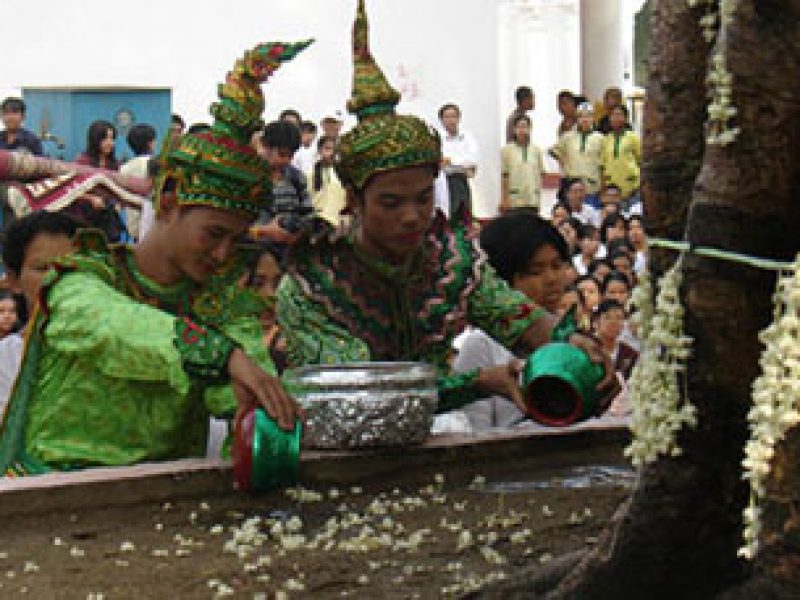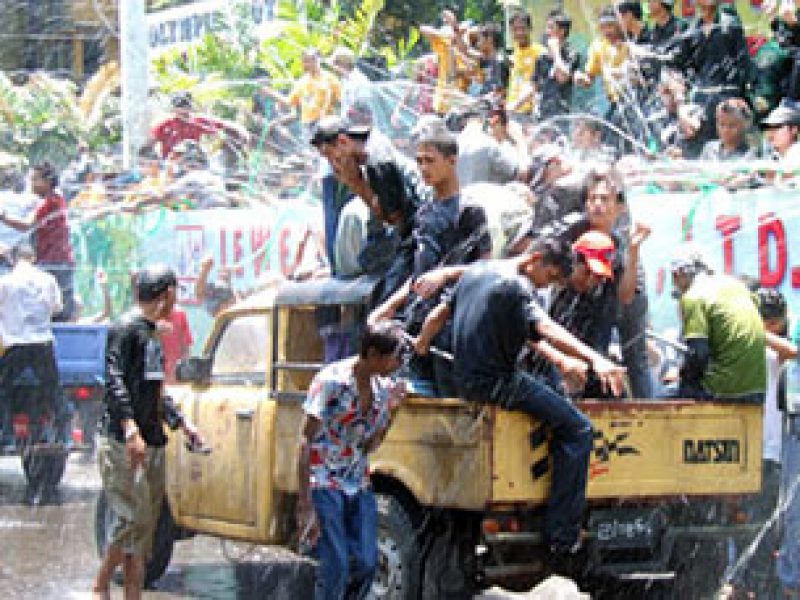People with a basic knowledge of the culture and custom of Myanmar will find it easy to live with its citizens without friction or discord. and leave in the same fashion. Though Myanmar social customs are quite flexible. the ground rules are important for convivial inter change.
Naming System
A Myanmar has no family name. A woman has her own name and retains it even after marriage. A child is normally named according to the day of the week he(or she) was born. whereby each day of the week is denoted by certain letters of the Myanmar alphabet. For example. Monday is denoted by the names Kyaw.Khin. Kyin. etc; Thuesday by San. Su. Nyi. etc. Another way to name a child is based on his (or her) date of birth.
A person is usually addressed according to his age. For older people. their names are pre-fixed with U(pronouced Oo) and Daw and are the equivalents of Mr and Ms respectively. A young adult is addressed by the Honorifics Ko (for males) and Ma (for females). A child is referred to as Maung and Ma for males and females respectively. Example: Khin Myat. a departmental manager. could be addressed as U Khin Myat by his colleagues but as Ko Khin Myat or Maung Khin Myat by monks and elders.Maha Thray Sithu. Sithu. Thiri Pyan Chi. Wunna Kyaw Htin. and Naing-ngat Gon-yi titles are civil awards conferred on individuals normally government servants for distinguished service.
Ceremonies
Births. engagements. and marriages are considered to be auspicious occasions or tha ye while sickness and death fall into nga ye or sad occasions. When a woman has given birth. it is usual for her friends and colleagues to give gifts such as feeding bottles and clothes. Gifts should never be given before the baby’s birth as some women are superstitious that this will bring misfortune to the baby. When the baby is 100 days old. a name-giving ceremony is usually held. Monks will be invited to chant prayers and bless the baby and in turn meals will be offered to all participants.
Some couples who are getting engaged may throw a party for their families and friends.Guests of honour at such parties are couples who have long and happy marriages. On such an occasion. the male guest of honour will give a speech to extol the virtues of the bride-to-be on behalf of the bridegroom’s parents. If you are invited to an engagement party. you may or may not bring any gift. Couples in Myanmar are married by registering at the registrar of marriages or by going through a ceremony conducted by a respectable couple at a grand hotel or by sheer mutual consent with no ceremony at all.
Suitable wedding gifts depend on the couple’s station n life. If they are young and are not financially stable. a cash gift in multiple of hundred (to symbolise a long life) is suitable. Otherwise. functional items such as crockery. electrical appliances. and pieces of cloth make excellent gifts. Gifts that are taboo include scissors. knives and anything black in color. Among office colleagues. a collection will normally be made to buy a gift for the couple or give the cash collection outright.
When a person is seriously ill. his or her relatives and friends are normally informed. Once informed. the friend or relative has an obligation to visit the sick person. Normally. gifts on such occasions would be fresh fruits or canned cereals. Many old traditional Myanmar are reluctant to be admitted into hospitals. However. with improvements in medical science. this attitude is changing. When a person dies at home. the body is bathed and dressed in the person’s best clothes. A monk will be invited to chant prayers. The funeral will usually take place three or five days after the day of death.
During the interim period. a wake will be held. During the wake. members of the deceased’s family keep vigil during the nights. Visitors who come to pay their last respects to the deceased are often served tea and black melon seeds. If a person dies in a hospital or elsewhere. the corpse id usually placed in a morgue. However. the wake will still be held at the home of the deceased.
Burial is still common in Myanmar but cremation is also performed. The recitation is also performed. The recitation of prayers by monks is part and parcel of a funeral. If one is informed of the death of the death of a friend. it is necessary to send a letter. or telegram if one is unable to visit the deceased’s family or attend the funeral. Failure to do this is insulting to the deceased’s family. Donations are usually given if the deceased ‘s family is financially backward. When you are attending a funeral. do not wear bright e celebrate this festival to rejoice in a good harvest. Also celebrate in January is the Equestrian Festival which dates back to ancient times.
Falling in April. the Water Festival (or Thingyan) is celebrated for three days to usher in the Myanmar New Year. In the cities and towns. makeshift pavilions with stages for singing and dancing are erected. and barrels are filled with water. Young people dance and sing on the stages and throw water on all and sundry. It is believed that being drenched with Thingyan water washes away one’s sin and bad luck. Decorative floats may also take part in processions.


The Kasone Festival usually falls in May. It was on the full-moon day of the Myanmar month of Kasone that Buddha was born. attained Enlightenment and passed away . As Buddha had attained Enlightenment while meditating under a Bodhi tree. the grounds of pagodas and monasteries are planted with many of such trees. On this day. people carry earthenware pots filled with water and water the Bodhi trees. Processions are also held in temple grounds.
The Waso Robe-Offering is performed to commemorate Buddha’s first sermon. and falls on the full moon day in June or July. The day also marks the beginning of the Buddhist Lent. At pagodas. monks are offered free meals and a robe-giving ceremony is performed with pomp and pageantry by disciples.
On the full-moon day of Thadingyut (usually in October). the Festival of Lights is celebrated to mark the descent of Buddha from Tavadinsa or the abode of devas. Arounf this day. pagodas. buildings. public parks and houses are decorated with strings of electric bulns. oil lanterns. or candles. and young people pay respect to their elders by offering them gifts of fruits. cakes or pieces of textiles.
In the Myanmar month of Tazaungmone which corresponds to either October or November. the Kahtein Robe-Offering is performed. This occasion is similar to the Waso Robe-Offering. Also celebrated in Tazaungmone is Tazaungdaing. a second Festival of Lights. At many pagodas through the country. all- night robe-weaving contests are held. The finished robes . which must be completed before daylight. are offered to Buddha images in the pagodas.Christmas is celebrated by those who have accepted the Christian creed with carol singing. parties. and midnight masses. just like in other parts of the world.
Religious Beliefs
Most Myanmar are Buddhist of the Theravada stream. Central to their religious beliefs is karma. the concept that good begets good and evil begets evils. Another belief is tat all living things go through reincarnation. If a person has committed sins. (he or she) will be reincarnated into a lower level being such as an animal or suffer in Hell; on the other hand. if he has done good deeds. he will be elevated to a higher level of existence to the world of devas. The ultimate aim in life according to Buddhist belief is to escape the cycle of rebirth and reach Nirvana.
Meritorious deeds that will help a person to achieve Nirvana include giving donations ( especially to monks) and abiding by the Five Precepts and practising Bavana (meditation).The Five Precepts are exhortation not to kill. steal. lie. drink alcohol. and commit adultery. The Five Precepts are codes of conduct for laypeople. There are also Eight. Nine and Ten precepts. meant to be practised by more serious lay devotees. The Jemghas or monks have to abide by the 227 rules of conduct or vinayas.
Superstitions
Some Myanmar people. especially those from the rural areas. have many superstitions. Astrology. palmistry and clairvoyance are sometimes relied upon to make important decisions. These may include marriage. going into a business partnership. naming a baby. and others. To offset bad luck. certain meritorious deeds or yadaya may be performed such as setting free some live birds or animals. building a footbridge. or mending a road.
Superstition of different cultures are interesting in some ways. Here are some of the Myanmars:-
Don’t go underneath a staircase. You will loose your will power.
Don’t go under a pole or rope. where women used to hang-dry their longyis. You will loose your will power.
Don’t leave a shoe or a slipper up-side-down. It’ll cause bad luck.
Don’t keep a broken glass or a mirror in homes. Replace the window panes asap if broken.
Don’t wash your hair within a week after a funeral in the neighborhood.
Don’t hit the pot with a ladle after you stir the curry. It’s like hitting your parents’ head.
Don’t hit 2 lids of pots and pans against each other. A tiger may bite you.
Don’t feed someone with the palm upward. The food might cause you disorder.
Don’t clip your nails at night. Ghosts don’t like that.
Don’t take kids to dark places. Ghosts may posses them.
Carrying some hairs of an elephant tail will avoid evil.
Male/Female Roles
Myanmar parents favour their sons over their daughters but the latter are treasured as well. Daughters are not considered a burden as no dowry is paid to the bridegroom when they marry. Traditional Myanmar women are not aggressive and usually play second fiddle to their husbands. Women are expected to help with the household chores and take care of their aged parents more than men. Where social life is concerned. unmarried women and bachelors tend to mix with members of the same sex. Between married couples. public displays of affection are rarely seen.
Boss/Employee Relationship
Myanmar employees are hardworking and loyal to their bosses. In return. a boss is expected to be a father figure and give help in times of need. Such help may be the giving advice to sort out personal problems or the granting of a loan in a financial crisis. As in all Asian cultures. Myanmar respect people who are older than them. To avoid friction in the workspace. make sure that a subordinate is not resentful of working under a younger supervisor. Negative communication is usually indirect. If it is necessary to discipline an employee. it is best to do it in private and with tact. Loss of “face” is a serious matter among Myanmar people.
Business Relationship
Friendship. trust. and honesty are important in a business relationship. Favours received. such as introducing a potential client or supplying a reference. must be repaid at a future time. When two Myanmar businessmen meet for the first time. chances are that business may not be discussed in depth. Rather. the meeting may be spent evaluating each other’s personality and business strengths and weaknesses. In general. it is easier for Asians to deal with Myanmar businesspeople than Westerners.
